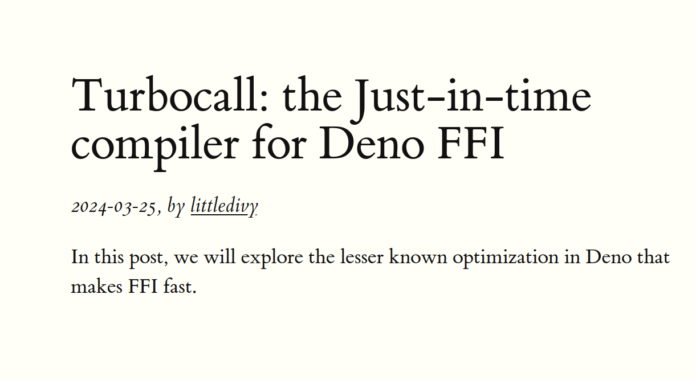2024-03-25, by littledivy
In this post, we will explore the lesser known optimization in Deno
that makes FFI fast.
Introduction – the engine
V8 1 Isolates are little sandboxes that
run JS. JavaScript runtimes give you the ability to call native
functions by reaching out of this sandbox. These native functions are
often referred to as “bindings”.
Optimizing these bindings are one of the most important optimizations
in a JavaScript runtime. Over the years, V8 has made significant
improvements in this area to make bindings faster for embedders.
Let’s look at an example of a V8 C++ binding:
void Add(const FunctionCallbackInfo<Value>& args) {
Isolate* isolate = args.GetIsolate();
// Check the number of arguments passed.
if (args.Length() < 2) {
isolate->ThrowException(Exception::TypeError(
String::NewFromUtf8(isolate, "Wrong number of arguments", NewStringType::kNormal).ToLocalChecked()));
return;
}
// Check the argument types
if (!args[0]->IsNumber() || !args[1]->IsNumber()) {
isolate->ThrowException(Exception::TypeError(
String::NewFromUtf8(isolate, "Wrong arguments", NewStringType::kNormal).ToLocalChecked()));
return;
}
// Convert the arguments to numbers.
double value = args[0]->NumberValue(isolate) + args[1]->NumberValue(isolate);
// Create a new Number value and set it as the return value.
Local<Number> num = Number::New(isolate, value);
args.GetReturnValue().Set(num);
}This does a bunch of stuff, like checking the number of arguments,
type checking, converting arguments and setting the return value.
Moreover, V8 has to jump through (quite literally) a lot of hoops to
make this work. It sets up guards and jumps out of the optimized JIT
code to the runtime.
What if there was a way to call bindings without moving out of the
optimized JIT code and without all the type checks?
V8 Fast API Calls2
V8 Fast calls are a relatively new optimization in V8.
V8 can call our native binding directly from the optimized JIT code
if we provide it with the necessary type information. The necessary
typechecks happen in the compiler itself including fallback to the slow
path.
int FastAdd(int a, int b);
// Extracts type information from the function signature
v8::CFunction fast_add = MakeV8CFunction(FastAdd);This results in massive speedups for repetitve native calls from
optimized JavaScript. The calls are inlined and theoretically as fast as
calling a native function.
Apart from native runtime bindings, one of the most common places
where this optimization is used is in FFI (Foreign Function Interface)
calls.
Enter Deno FFI
const { symbols } = Deno.dlopen("libc.6.so", {
open: {
parameters: ["string", "number"],
result: "number",
},
});Deno.dlopen is the API to open a dynamic library. Notice
anything familiar? We are defining the number of arguments, types and
the return value.
We could use this information to generate optimized native binding
and give it to V8!
Turbocall3: a JIT for JIT
Deno created a tiny assembler (in Rust ofc) to generate optimized
bindings for FFI calls based on the type information.
Deno.dlopen("libtest.so", {
func: {
parameters: ["buffer", "i32", "i32"],
result: "i32",
},
});Turbocall generates the following bindings:
.arch aarch64
ldr x0, [x1, #8] ; buffer->data
mov x1, x2 ; a
mov x2, x3 ; b
moxz x8, 0
br x8 ; tailcallThis is simply ARM64 assembly for something like this in C:
int func_trampoline(void* _this, FastApiTypedArray* buffer, int a, int b) {
return func(buffer->data, a, b);
}Most notably, it generates code to properly pass JS typed arrays and
arguments to the native FFI symbol.
I gave a talk on this topic at the DenoFest Meetup in Tokyo 4 which goes into more detail about
the implementation.
Benchmarks
This made FFI calls 100x faster in Deno: https://github.com/denoland/deno/pull/15125
Let’s see how this compares against other runtimes.
This is running sqlite3 and duckdb benchmarks on Deno, Bun and
Node.js. See benchmark source. 5
Turbocall in action
Slide from the DenoFest talk:
Future
It will be interesting to see how Static Hermes6
will compare against V8 fast calls. Both can probably generate similar
code at runtime but implemented very differently.
I’m also excited about just-js/lo7
which is a WIP low-level JS runtime that aims to generate V8 fast calls
bindings ahead-of-time (similar to Deno) but also allow for a more
engine-agnostic design where you could swap out V8 for other engines
like Hermes, Quickjs.
That’s it! Feel free to follow me on Twitter: https://twitter.com/littledivy
This document is available as PDF: https://divy.work/pdf/turbocall.pdf









